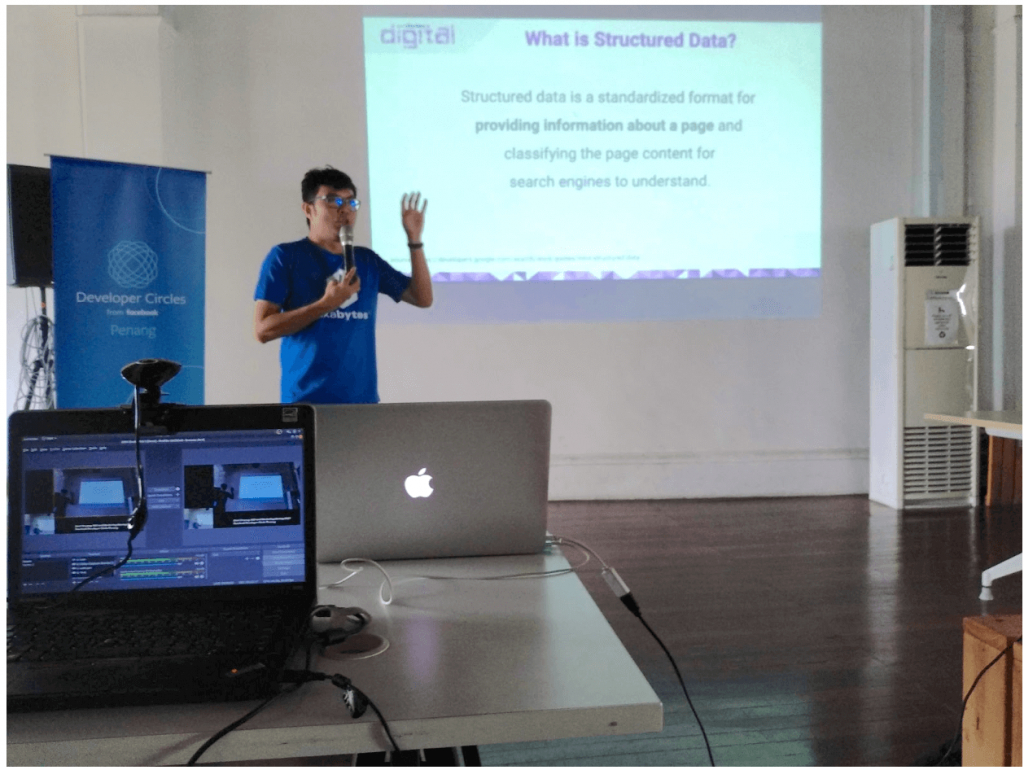Thanks to the invitation by Developer Circle Penang community, especially Mr. Gooi Liang Zheng (the Penang Lead of Facebook Developer Circle), I had the opportunity to share my SEO knowledge to fellow members. The SEO & Marketing Meetup took place at aCAT Penang, Georgetown.
The two speakers of the event were Calvin Lee and myself. As the first speaker, I was delighted to share on Structured Data about search engine optimization (SEO). Calvyn Lee took the stage later and shared his insight on “The Importance of Sales Funnel”.
Here is a summary of my sharing: How to Boost Your SEO (website rankings) using Structured Data
- What is Structured Data?
- How can structured data improve my SEO?
- How to implement it to my website?
- Tips & Suggestions
- Q & A

The official definition of ‘structured data’ is as follows, according to Google Search developer documentation:
Standardized format for providing information about a page and classifying the page content for search engines to understand.
Source: https://developers.google.com/search/docs/guides/intro-structured-data
Next, I moved on to show the audience various popular examples of structured data, such as products, breadcrumbs, events, FAQ, How-to and Recipe.
In fact, as I write, the total number of types of SEO has reached almost 30. To view the full list, click here: https://developers.google.com/search/docs/data-types/article
Where Google will keep updating and adding more types, requirements and official guidelines.

How can structured data improve SEO?
Here is a quick summary:
- Make it easier for Google to understand what your pages are and what your website is about. It will improve your search engine visibility.
- The extra rich content on your website — graph, featured snippet and voice searches — will increase your click-through rate (CTR).
- Add in new features as many websites are still not utilizing structured data. As always, users are attracted to the new things they see on Google search results.
Next, I explained the methods and tools to implement structured data.
This includes hardcoded, schema.org, Google Structured Data Testing Tool, Rich Result Test, Google Search Console, Schema Markup Generator (JSON-LD), codelabs.developer.google.com, Yoast SEO WordPress Plugin and Google Tag Manager.
Since the crowd is made of beginners and not coder members, I recommended using plugins as the starting point to install structured data on the website. It’s fast and easy to manage compared to the rest of the methods.
Lastly, it was a pleasure to share my experience, including the mistakes I made in structured data injection.
Key Takeaways
- The best practice is to read and follow all guidelines, solve all the errors/warning issues and don’t ever try to ‘cheat’ Google.
- The consequences will be manual actions or penalty — your website might experience a drop in ranking or even disappear from Google.
- Here is my presentation deck:
Although it’s just a short and simple sharing session, I loved the environment where everyone could network, contribute their experience and help each other.
See you in the next sharing!
BONUS: Here is a full video of my presentation, feel free to watch and learn!


Well done Martin, you did a great sharing !
Your sharing for the sales funnel is great as well